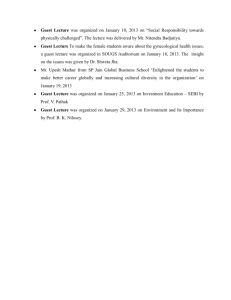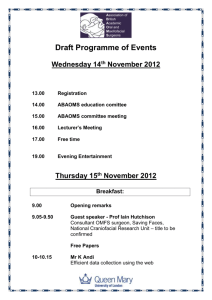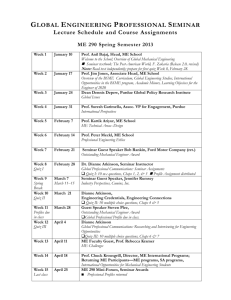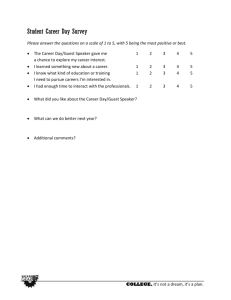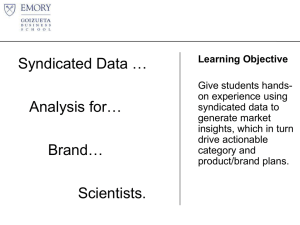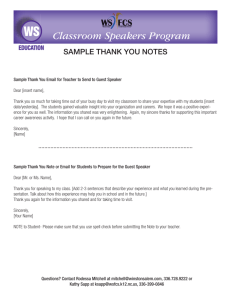RELI 101 Introduction to the Study of Religion
advertisement
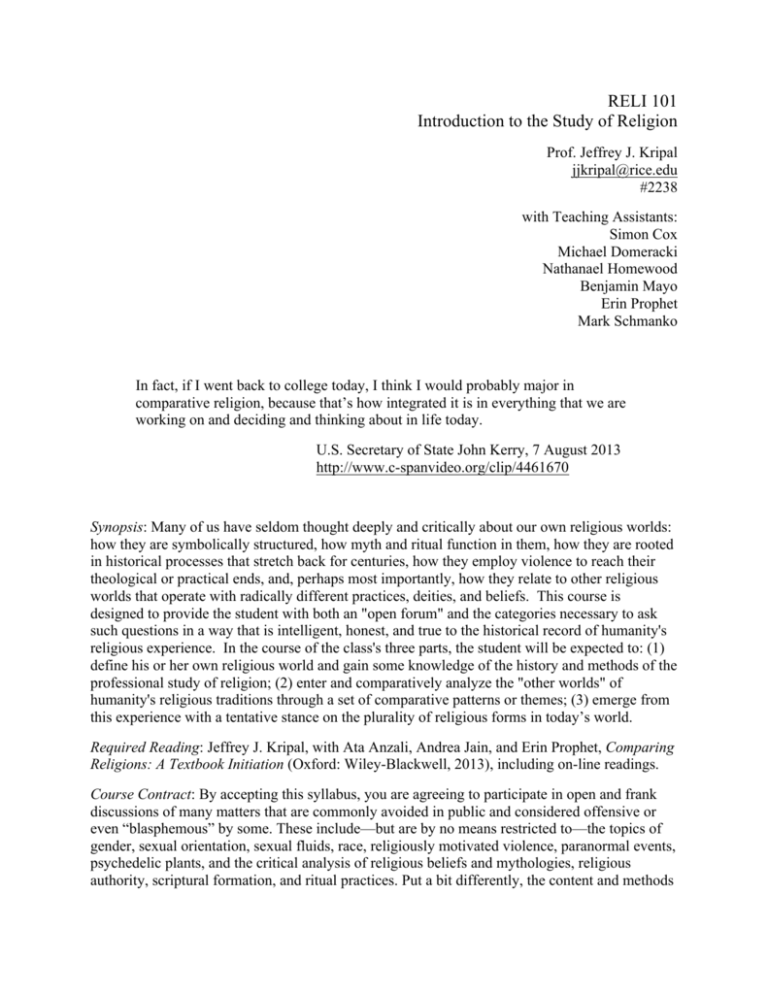
RELI 101 Introduction to the Study of Religion Prof. Jeffrey J. Kripal jjkripal@rice.edu #2238 with Teaching Assistants: Simon Cox Michael Domeracki Nathanael Homewood Benjamin Mayo Erin Prophet Mark Schmanko In fact, if I went back to college today, I think I would probably major in comparative religion, because that’s how integrated it is in everything that we are working on and deciding and thinking about in life today. U.S. Secretary of State John Kerry, 7 August 2013 http://www.c-spanvideo.org/clip/4461670 Synopsis: Many of us have seldom thought deeply and critically about our own religious worlds: how they are symbolically structured, how myth and ritual function in them, how they are rooted in historical processes that stretch back for centuries, how they employ violence to reach their theological or practical ends, and, perhaps most importantly, how they relate to other religious worlds that operate with radically different practices, deities, and beliefs. This course is designed to provide the student with both an "open forum" and the categories necessary to ask such questions in a way that is intelligent, honest, and true to the historical record of humanity's religious experience. In the course of the class's three parts, the student will be expected to: (1) define his or her own religious world and gain some knowledge of the history and methods of the professional study of religion; (2) enter and comparatively analyze the "other worlds" of humanity's religious traditions through a set of comparative patterns or themes; (3) emerge from this experience with a tentative stance on the plurality of religious forms in today’s world. Required Reading: Jeffrey J. Kripal, with Ata Anzali, Andrea Jain, and Erin Prophet, Comparing Religions: A Textbook Initiation (Oxford: Wiley-Blackwell, 2013), including on-line readings. Course Contract: By accepting this syllabus, you are agreeing to participate in open and frank discussions of many matters that are commonly avoided in public and considered offensive or even “blasphemous” by some. These include—but are by no means restricted to—the topics of gender, sexual orientation, sexual fluids, race, religiously motivated violence, paranormal events, psychedelic plants, and the critical analysis of religious beliefs and mythologies, religious authority, scriptural formation, and ritual practices. Put a bit differently, the content and methods of this course will call into question your most basic beliefs, whether they are religious or nonreligious. Such a challenge is not accidental or tangential. It lies at the very center of the purpose and goals of the course itself, which insists on the comparative and critical analysis of all religious traditions. If you are not ready to analyze such matters with the same critical thinking skills with which we analyze everything else in the humanities (political systems, cultures, novels, literature, art, history, etc.), do not take this course. The choice and responsibility lie entirely with you. Part One. Prehistory, Preparation, and Perspective August 25 Syllabus and Course Contract August 27 “What’s at Stake” read: CR, 1-7 watch (in class): Prof. Kripal on “Introduction” and “Part 1” August 29 read: CR, 9-27 The Comparative Practices of Ancient Polytheism and Monotheism September 3 read: CR, 27-39 The Comparative Practices of Some Asian Religions September 5 The Modern Practice: Deep Upstream read: CR, 43-58 watch (in class): Prof. Landau on the Bible and Comparison September 8 Guest Speaker: Michael Domeracki on the Origins of Biblical Studies September 10 The Modern Practice: Just Upstream read: CR, 58-73 September 12 read: CR, 77-93 Some Key Terms September 15 read: CR, 93-106 The Skill of Reflexivity and the Insider-Outsider Part Two. Comparative Acts September 17 Myth and Ritual read: CR, 109-125 watch (in class): Prof. Kripal on “Part 2” review: on-line “A, B, C: Six Guidelines” September 19 read: CR, 125-140 From Sacrifice to Founder Myths September 22 Guest Speaker: Nathanael Homewood on African Christianity and the Rise of Pentecostalism read: CR, 143-154 2 September 24 Religion, Science, and the Paradox of the Super Natural read: CR, 154-173 watch (in class): Prof. Bongmba on the Study of African Religions September 26 Sex and the Bodies of Religion read: CR, 177-192 watch (in class): Prof. DeConick on Gender and Sex in the Bible September 29 Guest Conversation: Prof. Robert Erlewine on Monotheism and Religious Tolerance October 1 read: CR, 192-205 Super Sexualities and the Sexual Ignorance of the Religions October 3 Mid-Term October 6 Guest Speaker: Sravana Varma on Hinduism read: on-line essays on Hinduism and Jainism October 8 read: CR, 209-225 Transmitting the Power: The Sociology of Religion October 10 read: CR, 226-235 The Saint and the Miracle October 13 Mid-Term Recess October 15 read: CR, 239-253 Angels, Aliens, and Anomalies October 17 read: CR, 253-267 The Comparative Practices of Popular Culture: Monsters and UFOs October 20 Guest Speaker: Prof. Clements on Early Christianity read: on-line essay on Christianity October 22 Guest Speaker: Prof. Cook on Classical Islam read: on-line essay on Islam October 24 Guest Speaker: Prof. Brian Ogren on Judaism read: on-line essay on Judaism October 27 read: CR, 271-284 The Human as Two: Patterns of Soul October 29 read: CR, 284-296 Traumatic Technologies and the End of the World October 31 On Halloween: The Mothman Cometh! read: Kripal, “The Mothman, God, and Other Monsters” (on Owl-Space) watch (in class): documentary film test-clip, “Authors of the Impossible” 3 Part Three. Putting It All Together Again November 3 Faithful Re-Readings: Exclusivism, Inclusivism, and Pluralism read: CR, 299-321 watch (in class): Prof. Kripal on Part 3 November 5 Comparison Is Justice read: CR, 321-331 watch (in class): Prof. Pinn on Black Religion November 7 read: TBA Guest Speaker: Mark Schmanko on Asian Religions in Euro-America November 10 Rational Re-Readings: Masters of Suspicion read: CR, 335-350 watch (in class): Prof. Parsons on the Social Scientific Study of Religion November 12 Guest Speaker: Erin Prophet on New Religions: Conversion, Coercion and Violence read: Lorne Dawson, “Are Converts to New Religions Brainwashed?” (on Owl-Space) read: CR, 350-361 November 14 Guest Speaker: Simon Cox on Chinese Religions read: on-line essays on Daoism and Buddhism November 17 read: CR, 365-379 Reflexive Re-Readings: Looking into the Looker November 19 The Filter Thesis: Neuroscientists at the Cusp read: CR, 379-392 watch: Jill Bolte Taylor, “My Stroke of Insight” November 21 Guest Speaker: Prof. Parsons on Freud and the Study of Religion November 24 The Third Boon: The Secrets of Death watch in-class: Ashish Avikunthak’s “Katho Upanishad” November 26 X-Men Before Their Time: The Human Potential Movement read: Kripal, “Esalen and the X-Men: The Human Potential Movement and Super-Hero Comics” (Owl-Space) December 1 Review for Final Exam December 3 Final Exam December 5 read: CR, 397-399 Epilogue from Houston 4 Student Learning Outcomes: 1: Critical Skills for the Study of Religion: Theory, Method and (Inter)Disciplinarity. Develop and apply critical toolkit to the study of religion and religious traditions, including (inter)disciplinary methodologies and theories. 2: Historical, Social and Cultural Dimensions of Religion. Understand and interpret religious traditions by examining religion(s) as historical, social, and cultural phenomena. 3: Psychological, Philosophical and Cognitive Dimensions of Religion. Understand and interpret the subjective dimensions of religion(s) through analyses that explore the psychological, philosophical, and cognitive dynamics of religion and religious experience. 4: Religious Plurality/Marginal Currents. Understand and interpret religious traditions by examining the plurality of religious voices and expressions, including currents that have been marginalized, neglected, repressed, and censored in a variety of sociological, psychological, philosophical, and political ways. 5: Multicultural/Transnational Currents. Understand and interpret religious traditions as multicultural and transnational in nature through attention to the impact of globalism, immigration, colonialism, and other forms of multi-cultural (non)religious exchange. 6: Religious Literacy. Gain basic objective knowledge of the beliefs, practices, and institutional histories of the world’s religions. Grading Principles: This is an introductory survey course that involves a reasonable amount of reading and a good deal of memorization. The success of the course will depend largely on whether or not you do the assigned reading and master the technical terms. Accordingly, the grade will be determined in four evenly weighted parts: (1) a series of 10 pop-quizzes based on the reading assignments; (2) a mid-term; (3) a final exam; and (4) a participation grade. The two exams will be based entirely on the content of the readings, for which you are responsible, regardless of whether I discuss everything in class. A good share, but by no means all, of the two exams will be based on the Glossary Terms. Quizzes can be given at any point during class, and no one is allowed to leave after taking the quiz: doing so will result in a zero on that quiz. Grading Policies: Here are six principles of grading. 1. I will use the pop-quizzes (that is, how many you take) to determine, roughly, how well you attended the course over the semester. Your participation grade will be figured with the following table: 1 missed: 100 2 missed: 90 3 missed: 80 4 missed: 70 5 missed: 60 more than 5 missed: 50 No pop-quizzes can be made up, although if you miss a pop-quiz with an excused absence (which you must arrange with me via e-mail beforehand), this missed quiz will not count as a missed quiz. I will, however, accept excuses after the missed class for sudden and severe illnesses. Your quiz average will be figured through a simple mathematical average, dividing 5 your total score by the number of quizzes you took. That is, missing a quiz does not result in a “0” grade. So, for example, if you took 7 quizzes, whose total score added up to 560 points (with each quiz worth 100 points), your quiz grade would be an 80% and your participation grade would be an 80%. 2. The grading scale is the standard one, for example, 80-82 B-; 83-86 B; 87-89 B+. 3. I do not give A+ grades. 4. There is no extra-credit. 5. There is no A+ grade. 6. I do not round up. For example, a 92.85% is an A-, not an A. All of these principles are based on extensive past experience with teaching this large survey course. They are designed to do two things: (1) encourage/guarantee class attendance and reading; and (2) keep the grading simple, transparent, and fair. I will not entertain exceptions to any of these principles. They are non-negotiable. Please review them carefully before taking this class, so that we do not have to revisit them at the end of the course. Technology Policy: Personal computer technology of any kind is strictly prohibited during class. This includes laptops, cell phones, I-Pads, basically anything with a computer chip in it. My experience is that these devices completely destroy the classroom atmosphere, as about 2/3 of any class is doing e-mail or is on Facebook or YouTube. I am not anti-technology. I am as addicted to it as you are. I simply want to preserve the teaching space as a teaching space. I want to have a conversation with you. Of course, we will employ technology as a class via the Smart Classroom devices and Owl-Space. Disability Policy: Any student with a documented disability seeking academic adjustments or accommodations (including those involving the use of technology) is requested to speak with me during the first two weeks of class. All such discussions will remain as confidential as possible. Students with disabilities will need to also contact Disability Support Services in the Ley Student Center. Syllabus Agreement: I reserve the right to change any of the reading assignments or the ordering of the lectures. The grading principles and requirements, however, will not change. Textbook Errata: The textbook we are using is my own. No book or textbook is perfect. All contain errors. Any factual errors or misrepresentations that you believe you find in the textbook I would much appreciate hearing about, either in class or via an e-mail or private conversation. Obviously, I would like to correct these. 6
